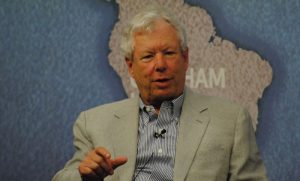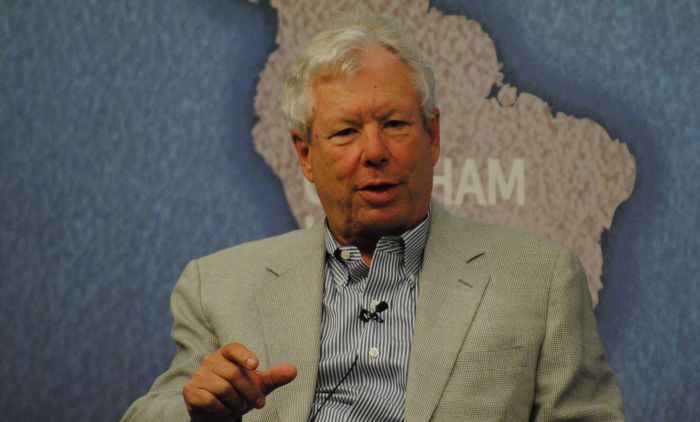Richard Thaler’s thought process and perspective on human behavior have influenced how we view economic phenomena and how they affect and are effected by people.

Earlier this week, the Economic Sciences Prize Committee announced that Professor Richard Thaler, a professor of behavioral sciences at Booth School of Business at the University of Chicago, is the recipient of the 2017 Nobel Memorial Prize in Economic Sciences.
The committee awarded Thaler the prize “for incorporating a more realistic understanding of human behavior into economic theory, and for using the resulting insights to improve public policy.” It mentioned his contribution to understanding the consequences of limited rationality, social preferences, and lack of self-control to individuals and societies. Among the discoveries attributed to Thaler are the so-called endowment effect and mental accounting. In recent years he has applied his insights on human behavior to the design of public policies, advocating the use of “nudges” to help people make better decisions.
I had the pleasure of spending many hours with Professor Thaler as a PhD student at Booth, back when it was still the Chicago Graduate School of Business. I was fascinated by the clarity of his thinking and description of human behavior. Succinctly, without fancy math or sophisticated utility functions, he portrayed how humans think and behave. His thought process and perspective on human behavior have influenced how I view economic phenomena and how they affect and are effected by people. His viewpoint continues to help guide my research approach as a finance professor.
The economists in the Finance Department at the Chicago Booth are known for their rigorous (some would say religious) approach to economics. Rationality and free markets are believed to always lead to optimal economic outcomes. When economists from the “rational” school write models of human behavior, they assume people act rationally as they respond to the incentives they face. Thaler, in contrast, has always emphasized that the individual decision maker is a human being who is, more often than not, imperfect. This individual has limited cognitive ability and self-control and is prone to biases. While rational economists assume people are homo economicus (or econs, as Thaler calls them), Thaler believes that people are people. They are imperfect, behave irrationally at times, use shortcuts, and have cognitive biases. Our economic models, therefore, should be realistic when describing such behavior, and our public policies should accommodate people who are imperfect decision makers.
During academic seminars and research conversations at the business school, Thaler has always been a rebellious voice in a group of economists from the rational school of thought. Despite holding what is often the minority voice, he holds his own in argument by identifying the weak points in the “rational” argument and, occasionally, ridiculing them.
Take for example the discussion around financial bubbles. Rational economists propose that, at the peak of a financial bubble, investors are willing to pay high prices for financial assets since they are comfortable with low returns going forward. This is the conclusion if we believe that investors are rational and we observe that they pay high prices and future returns end up being low. In heated debates following the dot-com bubble, Thaler used to vigorously point out that expressed investor beliefs are completely inconsistent with the predictions that rational economists make. He indicated that investor surveys clearly show that not only did investors not anticipate low returns in the year 2000, but in fact expected returns that were exceptionally high in a historical perspective, in the order of a magnitude of 20 percent a year.
Despite his insight that people are just people and that the rationality assumption has major limitations, Thaler is not hostile to markets. On the contrary, he recognizes the power of markets to punish people for their mistakes, but acknowledges that sometimes people need a guiding hand. For instance, homeowners often borrow against their home equity using mortgages that have enticing features like low interest rates in the early years, which revert to a high rate in later years. It has been shown that this type of mortgage leads to a high degree of delinquencies in later years, yet many people prefer it since they put too much weight on current cash flows and underplay risks in the future. One possible intervention that could save many homes lost to foreclosures is to require borrowers of such risky mortgages to pay a small tax upfront, while leaving plain-vanilla (less risky) mortgages exempt. The tax would make the risky mortgage less desirable and sway borrowers toward the safer mortgage.
Over the last two decades, Thaler has taken his insights further from the academic ivory tower and applied them to the field, looking for novel ways to help decision makers. The solution often came by way of simplifying a process, or harnessing our knowledge of behavioral finance to help people make better decisions. In a celebrated work with his mentee Shlomo Benartzi, for example, he designed an intervention to increase the savings rates for retirement. Cognizant that people have limited self-control, which means they find it hard to put aside present income but do not mind making promises about putting future income aside, Thaler and Benartzi enrolled employees in a Save More TomorrowTM plan: employees commit today to increase their saving rate in the future. The result of this plan was a significant increase in the employees’ savings rates.
The message I took from my interactions with Richard Thaler, and that I believe is shared by many of his mentees, is that economics is a science of people. Our mission is to understand economic and financial phenomena as driven by human behavior, which is not always perfect or rational. Furthermore, by understanding how people behave, we can offer solid solutions and increase societal welfare.
Congratulations Professor Thaler on winning the Nobel Prize! The fields of economics and finance have greatly evolved thanks to your contribution and leadership.
(Professor Itzhak (“Zahi”) Ben-David is the Neil Klatskin Chair in Finance and Real Estate at The Ohio State University Fisher College of Business. He serves as the Director of the Ohio State University Center for Real Estate. He teaches real estate finance classes to undergraduate and MBA students.)
Disclaimer: The ProMarket blog is dedicated to discussing how competition tends to be subverted by special interests. The posts represent the opinions of their writers, not those of the University of Chicago, the Booth School of Business, or its faculty. For more information, please visit ProMarket Blog Policy.






